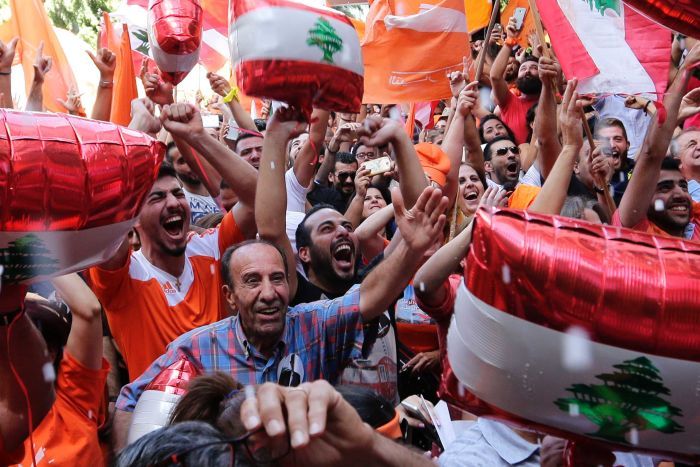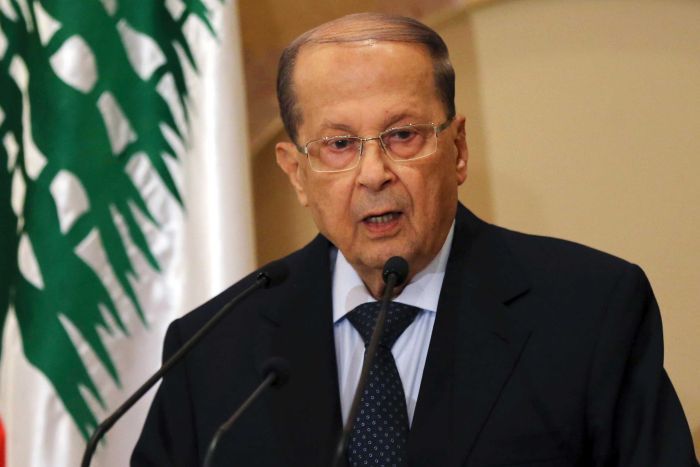Lebanon's new president Michel Aoun does not signal start of a new era
Posted
 Photo:
Supporters of Michel Aoun let off fireworks and assault rifles in the streets. (AP: Hassan Ammar)
Photo:
Supporters of Michel Aoun let off fireworks and assault rifles in the streets. (AP: Hassan Ammar)
Lebanon's Parliament has elected an 81-year-old Maronite Christian, Michel Aoun, to the presidency after nearly two-and-a-half years of political deadlock.
His supporters let off fireworks and assault rifles in the streets, and he delivered a speech vowing to protect Lebanon from the "fires" engulfing neighbouring Syria and Iraq.
That is all good news — and the election of a president might mean the bloody-minded, zero-sum game of Lebanese politics could ease the pressure on the nation's other key institutions and bureaucracy, allowing many important decisions to be made after such a long period of paralysis.
In his speech Mr Aoun said:
"I have come from a long history of struggle full of sacrifices, especially in the military establishment … I hope that we will guarantee the stability that the Lebanese hope for."
But it is not as if the whole nation is breathing a sigh of relief.
Mr Aoun is very much of the old guard, a warrior of the civil war era who battled Syria's military and a rival Christian militia before making his escape in an armoured vehicle to exile in France.
When a mass protest movement forced Syria to withdraw its troops in 2005, Mr Aoun made a triumphant return.
A win for Iran, a loss for Saudi Arabia
But now, in a twist as stark as it is typical of Lebanon's politics, he is in alliance with Hezbollah, the Shiite movement long supported by Syria, which has sent its own troops across the border to fight Syrian rebels and short up the government of Syria's President, Bashar al Assad.
Amidst the power plays of the Middle East, that translates as a win for Syria's main ally Iran, and a loss for Iran's strategic rival, Saudi Arabia.
 Photo:
In his first speech, Michel Aoun demanded the return of all Syrian refugees. (AP: Hussein Malla, file)
Photo:
In his first speech, Michel Aoun demanded the return of all Syrian refugees. (AP: Hussein Malla, file)
The Saudis back Saad Hariri, the leader of the largest Sunni bloc in Parliament.
After holding out against Mr Aoun, Mr Hariri endorsed him for the presidency last week — and while Mr Hariri is expected to be made prime minister, again, the development is seen as a sign of his financial and political weakness.
So it is no wonder that Ali Akbar Velayati, the top foreign policy advisor to Iran's Supreme Leader Ayatollah Ali Khamene, said:
"This is surely a victory for [Hezbollah leader] Sayyed Hassan Nasrallah."
And it is not like there is not a sea of bad blood here.
Hezbollah operatives are accused by an international tribunal of the car bomb assassination of Mr Hariri's father, former prime minister, Rafic Hariri.
Hezbollah denies that charge — but, as well as allegedly killing a former prime minister, Hezbollah's operatives run a militia more powerful than the official armed forces, which makes a mockery of the idea that a president is some sort of "commander in chief".
Syrian refugees unpopular with Aoun's support base
It has long been a sore point with Hezbollah's rivals, but now the militia is fighting openly in Syria it raises more uncomfortable questions about Lebanon's sovereignty.
In his first speech, Mr Aoun did not just pledge to fight terrorism in Lebanon, he also set out some basic requirements of a settlement to the civil war in Syria, demanding the return of all Syrian refugees.
More than 1 million refugees have put enormous pressure on Lebanon's population of just 4 million.
But, remembering the history of Syria's long and often brutal military presence in Lebanon — and the fact that most of the refugees are Sunni Muslims — they are also unpopular with many in Mr Aoun's Maronite support base.
The refugees fled a conflict fuelled by a rebellion tainted by jihadism and a government so brutal it has been accused of crimes against humanity, so debate about their future in Lebanon is a potent symbol of the difficult — and possibly ugly — politics yet to come.
The next hurdle for Lebanon's ill-served voters will be parliamentary elections due next year — and there is already speculation the elections will be delayed while the nation's leaders argue over the next set of deals, including calls to change, or rebalance, the sectarian based political system.
The men who voted in Parliament wore fine suits, and the hall is lined with beautiful honey coloured timbers.
But, as many in Lebanon will tell you, this is still militia territory — and the rival war-lords have not finished their manoeuvring by a long shot.
Topics: world-politics, government-and-politics, lebanon








